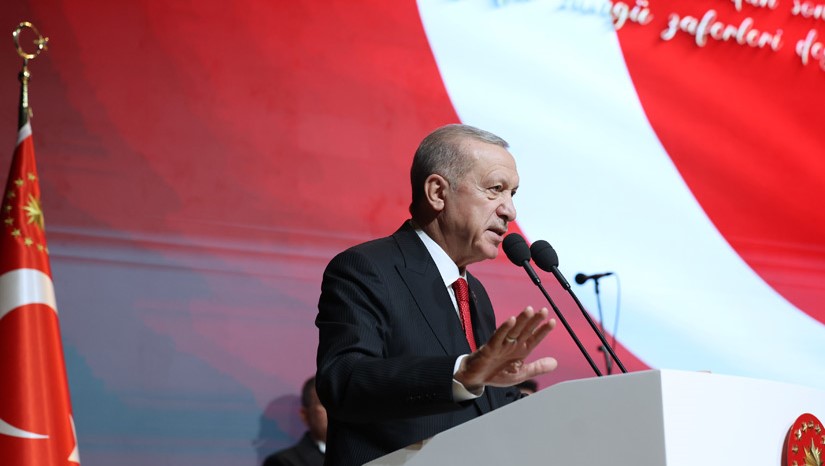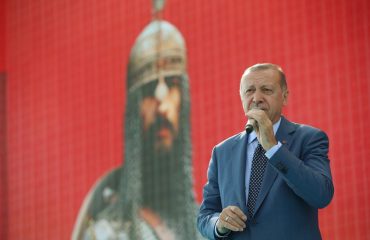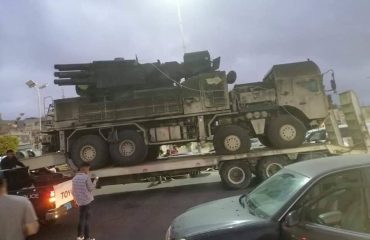

While all state and non-state actors are seeking to enter the Trump era with new positions, Erdoğan is preparing for a comprehensive political-military move. It would be unfortunate if this move gets reduced to just a new Constitution and re-nomination bid. (Photo: Presidential Office)
President Tayyip Erdoğan delivered two significant speeches on November 10th, signaling Türkiye’s intention to launch a major political-military initiative in the “upcoming period.”
The first speech was delivered on the 86th commemoration of Mustafa Kemal Atatürk’s death, the founder of the Turkish Republic. The second followed a Cabinet Meeting at Çankaya Mansion—the historic presidential residence that housed all presidents until Erdoğan relocated the presidency to Beştepe during his term.
Media coverage primarily focused on the speeches’ domestic political implications: his criticism of main opposition CHP leader Özgür Özel regarding trustee appointments to certain municipalities, and his response with the familiar rhetoric from Atatürkist circles about “if Atatürk had lived another decade.” However, it’s becoming increasingly clear that these themes, along with MHP leader Devlet Bahçeli’s recent Öcalan initiative, are components of a broader political-military operation that Erdoğan is methodically signaling.
The “upcoming period” and the Trump factor
The meaning behind Erdoğan’s reference to the “upcoming period” becomes clear through careful analysis.
His statement that “While the global system undergoes its most significant transformation since the Cold War, Türkiye cannot afford to be a mere spectator” provides the key context for understanding this timeframe.
This period, in Erdoğan’s view, is characterized by “borders being redrawn through bloodshed, bombardment, and political assassinations.” This encompasses Russia’s invasion of Ukraine, Israel’s military operations in Gaza, the West Bank, and Lebanon, assassinations of Ismail Haniyeh and Hassan Nasrallah, and attempts to revive Kurdish state aspirations through the PKK amid the Syrian conflict.
Yet, given that these developments are already unfolding, why does Erdoğan specifically reference an “upcoming period”?
The unspoken catalyst appears to be Donald Trump’s potential return to the U.S. presidency.
Trump’s re-election would fundamentally alter global political-military equilibriums. When Erdoğan declares “we won’t remain spectators,” he’s primarily signaling to international actors that “Türkiye will be an active player” in this new landscape with a political-military move.
Strategic positioning ahead of Trump administration
Trump’s central foreign policy promise centers on “ending wars.” Following his nomination, he promptly engaged with Russian President Vladimir Putin, encouraging de-escalation in Ukraine. His advisor Bryan Lanza’s BBC statement suggested that Ukrainian President Zelenskyy should “prioritize peace with Russia over territorial reclamation.”
While Trump pledges to resolve Middle Eastern conflicts, he’s unlikely to undertake actions contrary to Israeli interests. On the other hand, Trump, as the architect of the Abraham Accords, appears aware of the warnings from Arab autocracies about their destabilized domestic politics and political-military balances, as expressed in Saudi Crown Prince Mohammed bin Salman’s warning that ‘Young people are disturbed by Palestine.’ And he seems to be indicating that this will come at a cost. Indeed, Qatar was the first to receive this message, announcing its withdrawal from mediating with Israel by ending its hosting of Hamas’s Political Bureau, which had been ongoing since 2012.
Every state and non-state actor is maneuvering to establish their position before Trump potentially assumes office on January 20, 2025. Türkiye is actively participating in this strategic repositioning.
The military political dimension: Beyond PKK
The military-political initiative Erdoğan signals appears driven by Türkiye’s imperative to establish a strategic position before Trump’s potential return. He articulates the military component with notable precision:
“In the coming period, we will complete the missing links in our security zone along our borders. Put simply, we will definitively sever all connections between terrorist organizations and our national borders.”
This refers specifically to the Syrian and Iraqi frontiers. During the 2019 Tel Abyad operation in Syria, then-President Trump halted Turkish forces’ advance toward Kobani and Qamishli by dispatching Vice President Pence to Ankara. Under Biden’s administration, U.S. cooperation with PKK-affiliated Syrian organizations has intensified.
With the Gaza Crisis, there has been increasing discussion about the importance of armed Kurdish presence in Syria and Iraq – even without a Kurdish state – as Israel’s forward defense against Iran.
When Erdoğan says “Our real struggle is not just with terrorists, but with those who unleash them upon us, those who have inflicted this terror scourge on our nation for 40 years,” he is actually referring not only to the US, but also to Russia, Iran, and Israel.
Domestic front consolidation
The contours of this military-political initiative appear to have been established during the October 3 National Security Council meeting.
It’s becoming apparent that Erdoğan’s meeting with MHP leader Bahçeli wasn’t solely about Bahçeli’s “Öcalan Initiative” on October 22. Similarly, Bahçeli’s surprising move to shake hands with DEM Party members on October 1, which caught everyone off guard, signals that this planning had begun earlier.
Bekir Ağırdır, including PKK’s bloody TUSAŞ attack in this framework, observes that “Clearly, every formal and informal actor has been aware of each other’s preparations for months, and they have been prepared with scenarios for counter or lateral moves.”
The timing suggests preparations began as early as the May 28 MGK meeting, with implementation accelerating as predictions of Trump’s victory gained momentum in Ankara.
Erdoğan’s emphasis on the concept of an “internal front” during the AKP parliamentary group meeting reveals the domestic dimension of this military-political initiative. This manifests through a quasi-mobilization approach, evident in the appointment of trustees to municipalities and efforts to characterize the CHP’s protest against their mayor’s arrest as near-treasonous, aimed at preventing solidarity with the DEM Party.
The strategic embrace of Atatürk’s legacy
Erdoğan’s apparent embrace of Atatürk’s legacy on November 10 aligns with this “internal front” mobilization strategy. His attempt to frame the CHP’s solidarity with DEM over trustee appointments as quasi-collaboration with adversaries carries significant military-political implications.
Even though he ignores and refuses to shake CHP leader Özgür Özel’s hand at Anıtkabir and accuses him of holding an “illegal rally” with DEM Party’s Ahmet Türk, he still addresses him as “Honorable Chairman” of CHP, leaving an open door – similar to how Özel continues to say “Honorable President” even while nearly accusing Erdoğan of dictatorship.
At this point, it’s worth noting that when Özel requested MIT (National Intelligence Organization) Chief İbrahim Kalın to brief them on the security situation, just as he did for the AKP, there was no negative response to this request.
Of course, we shouldn’t forget Bahçeli’s statements that everything points to the need for a new Constitution to make Erdoğan eligible as a candidate again.
If Türkiye’s quest for a stronger position in the new global political-military reshaping gets reduced merely to a new Constitution and Erdoğan’s re-candidacy, it would be a great disservice to the country.


